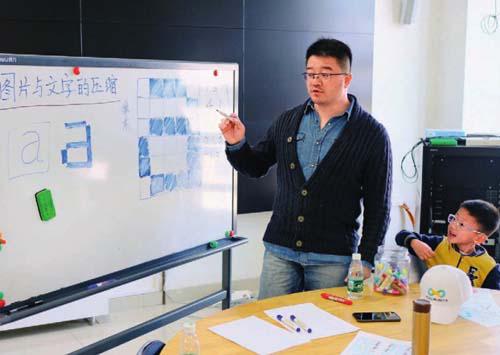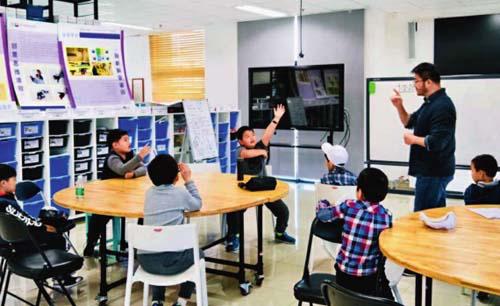Learning through Play
2018-07-12BystaffreporterZHOULIN
By staff reporter ZHOU LIN
WE are living in a fast changing world. All the knowledge and techniques we learn today are already outdated when it comes to the upcoming needs of tomorrow. Our offspring may have to change their jobs or careers constantly in their lifetime, and vocational education and lifelong learning are necessary for them to adapt to this changing world. Tsinghua University Lab for Lifelong Learning (TULLL) was born to address the needs. Team members of TULLL firmly believe that children should develop their internal motivations, independent thinking, creative capability, as well as the ability to establish positive connections with surroundings and other people, and all these are necessities for them to deal with future challenges. “Learning through play” prepares children to grow into creative, engaged, lifelong learners.
Inspiring Kids Curiosity
Zhang Fei, or Alex, is the curriculum design leader of TULLL. A graduate of Tsinghua University in 2008, Alex has a bachelors degree in automation and a masters degree in business administration. A wide range of hobbies and interests and his rich work experience in multiple areas prepared him to be a qualified teacher. Starting from the autumn semester of 2014, Alex became a full-time teacher in the primary school attached to Tsinghua University, along with his six-year-old son who began his studies there, where he designed curriculums to teach basic knowledge of robotics programming for students. In April 2016, Alex joined the team of TULLL and was responsible for designing a scientific curriculum, which he called “unplugged programming class.” The curriculum series is for first-grade primary school students who are encouraged to use simplified tools, instead of computers or expensive teaching instruments, to learn knowledge about computer science in games.
How to teach programming without computers? Alex devised a teaching scenario called “Presidential Meeting.” It is a game especially designed for children to understand that in the Internet era, we have to share information with others to make our life more convenient but also we need to protect our privacy, giving the kids a concept of information security and cryptographic protocols.
Alex had to work a bit to gain the kids attention initially. “Today, we are going to talk about a big issue!” Pupils immediately turned their heads to Alex waiting for the big news with curiosity and excitement.
The story started from the Facebook data leak scandal. Alex gave a brief introduction about the world largest social media company Facebook, and the disturbing news report that the data of more than 50 million Facebook users were inappropriately used by a British data analysis company in activities allegedly connected with U.S. President Donald Trump during his 2016 campaign. The misuse of the private data was reported as an abuse of user privacy.
For the storyteller Alex, challenges lay at every step. He had to be ready for all kinds of childrens questions. “Why does Facebook have so much user data?” “What is the data used for?” “How does the data analysis company get access to the data and how does it predict peoples behaviors?” “Why do the presidential campaign teams need this data?”“How are users being controlled?”
In early education, the priority is to protect childrens inherent curiosity and maintain their enthusiasm for learning, meanwhile empowering them with scientific learning methods. Teachers thereby have to prepare for all questions from kids, demanding a knowledgeable and versatile teacher with a broad knowledge of various disciplines and in-depth knowledge of education and psychology.
Problem Solving in Creative Ways
When the kids understood the details of the data leak scandal, they were shocked, “Oh my God! My parents may be in danger. Evil-doers can steal their personal data and our family can be manipulated.”
Now it was time for Alex to pose the big question: how to protect our privacy?
Childrens answers varied including using cipher code, fingerprint lock, and face ID. Some suggested delivering their online purchases to others houses, some considered deleting their WeChat accounts or even throwing away their cellphones.
Alex kept on asking, then “how can we order takeout food, or call a taxi on the Didi App, or use GPS in a foreign country without knowing their language, or use mobile payments for shopping?”
Kids soon realized that in the era of the Internet, nobody could be isolated from the network; in other words, no one could live a life without information exchanges. How to protect our critical information and data while allowing it to better serve us?
Alex successfully introduced the kids to games. He created a simulation in which every child played the role as a countrys president who controlled a certain amount of nuclear weapons. They had to keep it a secret so as to ensure their countrys security, but they were also facing attacking aliens which required that all nations united and calculated the total number of global nuclear weapons. How to cooperate with other nations and also protect their own privacy?
“After a brainstorming session, the little presidents around six or seven years old worked out some reliable solutions.” Alex mentioned that one group of children proposed that each nation divided their number into several parts and gave each number to different persons, mixed them together without knowing anyones nationality, and then summed up all the numbers.
Alex also gave his own solution which needed an organizer and some national presidents. The orga- nizer spoke out a random number and passed it to the President of country A, adding it to the nuclear weapon number in As country; then added it to the number of country B, and kept on going the calculation until all the countries numbers were included. In the end, the organizer subtracted the random number and the result would be the sum of all statistics. In the whole process, no one knew exactly how many weapons other countries had. The random number is what is known to as a cryptographic protocol which can protect information security and privacy.
Redefinition of “Play and Learn”
During the whole process of the game, there were no presumptions, the key point was to encourage childrens active thinking so as to find solutions through team cooperation and give them basic knowledge of computer science.
As the late professor Seymour Papert from Massachusetts Institute of Technology observed, we should realize that children are outstanding learners and adults should sometimes learn from them rather than asking them to think like us.
In Alexs game design and teaching practice, we may discover that the TULLL team redefined “play and learn.” Learning is not simply memorization of knowledge; the physical, social, emotional, cognitive and creative capabilities of children also need to be promoted through games based on their inherent nature such as the love of discovery, creative thinking, and active expression of their own ideas.
Those interesting games help children observe the connections between different matters, effectively understand knowledge, and express their understanding of the world. Childrens devotion to the process, their curiosity, excitement in games, and their positive experience all have a close connection with learning.
While people are still discussing the “knowledgebased society,” professor Mitchel Resnick from MIT prefers to talk about the “creative society.” Early in 2006, Mitchel predicted that China was progressing from “Made in China” towards “Created in China.”Creativity is an opportunity but also a challenge for China and the crux of “quality education” is to cultivate childrens creativity. Preparing todays children for tomorrows “creative society” is the thing both educators and parents need to think on and take action.
